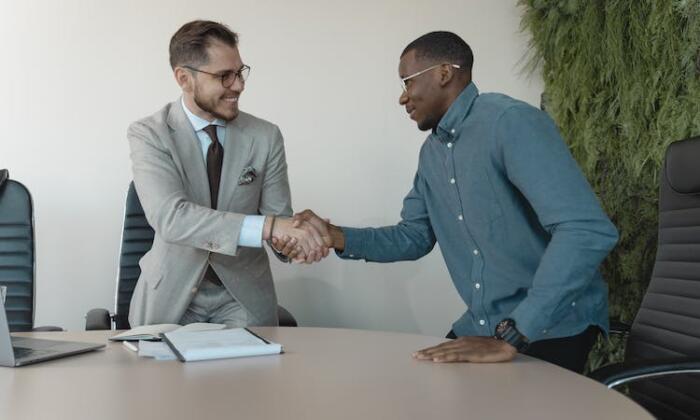How to Face an Interview the Right Way

Want to do well in a job interview? Here I am telling you How to Face an Interview in the Right Way. The opinion on this topic may vary from person to person. As everyone’s experience is different. Here’s what My experience says on how to Face an Interview in a Right Way
To do good in a job interview, applicants must prepare themselves to face a job interview to be accepted.
Here’s how to Face an Interview the Right Way and to get accepted:
1. Understand the company and the vacancy you are applying for.
The first tip to Face An Interview so that you are accepted is to know what kind of company you are applying for. Applicants must understand the position and background of the company they are applying for.
Also Read: Top PHP interview Questions for freshers with answers
The way to do this is to do research before the interview day. Get to know the industry and company profile through their official website and the information available for the company.
Applicants can search for vacancies in the job section of the company career page they’ve applied for.
Usually, job portal sites also include a brief description of the company and the requirements for the vacancy.
During job interviews, interviewers often ask what the candidate knows about the company. Therefore, make sure to “get to know” the company you are applying for before entering the interview stage.
2. Tell me about yourself: the interview starter
While you face an interview, this question is mostly served as the starter in your interview. It may be the first question in the interview. If not then you will not have to wait much for that, it’s coming quickly.
You can answer this question by telling about your campus, major, experience, passion, and anything else that will lead to work.
Don’t tell things that are not related to work, such as the names of your parents, your parents’ positions, your family background, and so on.
3. Use polite words and body movements in the interview

Furthermore, to get selected for the job interview, you must be polite. How you speak, does matter a lot in an interview. Be polite and choose your words correctly.
Also Read: Tips to answer “why do you want to work here?” in interview
Speaking style, choice of words, and body language are factors that are often forgotten by candidates during a job interview.
However, these things can describe the applicant’s skills in communicating with colleagues in the office. Avoid using an impolite speaking style and using a high tone when answering.
Also, adjust the language style to the interview context, i.e., use formal words. Most companies have a very formal culture. Below are some examples for you to understand:
- Informal: “Yeah” Formal: “Yes” or “Certainly”
- Informal: “Hey” Formal: “Hello” or “Good [morning/afternoon/evening]”
- Informal: “Stuff” Formal: “Items” or “Materials”
- Informal: “Got” Formal: “Obtained” or “Received”
- Informal: “Okay” Formal: “Certainly” or “Understood”
In contrast, startup companies tend to be more relaxed. In addition, make sure not to use gestures that have a negative connotation such as pointing, crossing your legs, or crossing your arms over your chest during a job interview.
4. Be relaxed and calm when facing an interview.
A good job interview method to get accepted next is not to be nervous.
If you feel nervous because this is your first interview or because you are looking forward to this job, try to be more relaxed and calm. You can take a deep breath to calm your racing heart and make you nervous.
Also Read: Top 5 soft skills to show during an interview
If you get nervous, your body language shows this to the interviewer, and you may end a bad interview. For example here are some body language cues that might indicate nervousness in a candidate during an interview:
- Fidgeting: Excessive movement of hands, feet, or objects like pens or papers.
- Avoiding eye contact: Looking down or around the room rather than making direct eye contact with the interviewer.
- Tense posture: Sitting very stiffly or with shoulders hunched up.
- Nervous gestures: Tapping fingers, playing with hair, or touching face frequently.
- Frequent swallowing or dry mouth: Nervousness can manifest as dryness in the mouth, leading to swallowing more often.
- Shaky voice: The candidate’s voice may quiver or crack due to nervousness.
- Sweating: Excessive sweating, especially on the palms, forehead, or upper lip.
- Rambling speech: Speaking quickly or without clear direction, possibly due to nervousness.
- Difficulty concentrating: Trouble focusing on questions or providing coherent answers.
- Pacing: Restless movement, such as tapping feet or pacing around the room before or after the interview.
5. Practice answering interview questions yourself to face an interview
The fifth best way to interview for a job to get accepted is to practice. Practicing may not always make your answers during an interview perfect. However, this will really help you create a good impression on the interviewer.
You can find out what interview questions are commonly asked. After that, practice answering by standing in front of a mirror. This approach helps you recognize and sort out the facial expressions that are helpful to display when speaking with the interviewer later on.
You can create a better impression and the interviewer will not misunderstand your expression.
Also Read: Commonly asked PHP interview questions
6. Be on time to face an interview

A helpful job interview tip to increase your chances of success is to make sure you arrive on time and avoid being late.
When you are going to attend an interview session, try to arrive early, about fifteen minutes earlier than the specified time.
Arriving early demonstrates your commitment to the scheduled time.
7. Be confident and active in the interview session.
Sometimes, you may be reluctant to actively participate in speaking in the interview session because you are worried about crossing the polite line.
In fact, there is a big difference between being polite and being passive. Polite means not interrupting the speaker when speaking, and passive means you will only speak when asked.
You must be able to contribute more actively in an interview.
Conclusion
Preparing for a job interview involves researching the company and position, using polite language and body language, staying calm, practicing interview questions, arriving on time, and being confident. By following these steps, you can present yourself effectively and increase the chances of getting hired.
These were my tips to face and interview in a right way. So be enthusiastic about practicing before carrying out the interview process. If you ant thoughts share in comments section.
Good Luck!!

Leave a Reply